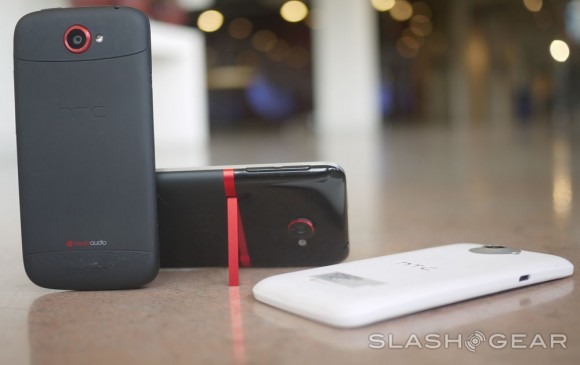HTC's Precipice Moment
Seldom has the smartphone divide looked so broad. HTC's financial results for the last quarter, revealed earlier today, puts the company in with struggling Nokia and RIM, an ocean away from the cash-stacked Apple and Samsung. Having already posted one appalling quarter this year, HTC missed market expectations and posted another year-on-year slump in profit, as the One Series failed to set consumers alight in the way the company had hoped.
HTC hasn't confirmed specific sales performance for each of the One Series models – and it's unlikely to, for that matter – but with the bulk of consumer attention seemingly taken by the Samsung Galaxy S III and the whispers of Apple's iPhone 5, it's clear the trio didn't do enough to tun the firm around in the way it was predicted to. Apple can share some of the blame there, though we don't imagine the company will be feeling particularly contrite; an import ban in the US kept key HTC phones from shelves, until it could hurriedly rework software to suit.
Still, apathetic consumers and litigious rivals don't give HTC a pass on what it might have done to better position itself in the cut-throat mobile marketplace. From being the poster-child of Android innovation to seeing its phones described as the "you might also consider" option, HTC could've turned the tide if it had wised up to what it could change and been realistic about what it couldn't.
Samsung and Apple – the two companies really succeeding today – have something in common: each has a strong hand on the hardware supply chain. Apple does that by collaborating with suppliers and hurling fistfuls of cash; Samsung pretty much owns its own supply chain (and is in some cases the supplier being showered with Cupertino dollars) and has first pick of the innovation spoils.
[aquote]HTC is reliant on others for key parts of its range[/aquote]
In contrast, HTC is reliant on others for most key parts of its range. Its chipsets and displays are made by third-parties; Windows Phone and Android are controlled by Microsoft and Google respectively. Unlike Samsung, which took a stand in the US with the Galaxy S III and said "no more needless customization" to the carriers, HTC hasn't quite been able to break free from the (expensive and time consuming) obligations of creating needless differences in models for different networks.
Meanwhile, HTC has neglected many of the areas in which it could have seized control. It sensibly pared back the aesthetic overload of Sense, its customized Android skin, but shuttered the companion cloud service just as rivals were building out their online backbone. Back in March, HTC said its newly renovated HTCSense.com would be along soon to replace the closed service, but three months on there's still not a whisper of what the company intends.
What it does have still active, meanwhile, is under-utilized. HTC Watch, the streaming movie service, could've been HTC's answer to iTunes, but it's little more than another app on the launcher; there's no "three free rentals!" promo to lure users into signing up, and the potential integration between it and HTC's Media Link HD has been ignored in retail. HTC pushed ahead with Beats headphones bundles (while failing to do the obvious there, too, and use the music focus to push downloads from the preloaded MP3 store) when it could have paired its phones with the Media Link HD and encouraged buyers to spend on video content too.

Meanwhile, although Sony is grabbing headlines in the past week with its Gaikai buy, HTC could've been driving mobile gaming courtesy of its OnLive investment since last year. The HTC Flyer arrived with an OnLive app, for cloud gaming, but since then has singularly failed to do anything meaningful with it. At the same time, Apple has seen exponential growth in iPhone gaming; now HTC has apparently given in on OnLive altogether, and thrown in with Sony and PlayStation Certification.
[aquote]There's a glaring omission in HTC's line-up: tablets[/aquote]
Finally, there's the glaring omission in HTC's product line-up: any sort of legitimate tablet competition to the iPad. The Flyer flopped; the larger Jetstream that followed it proved simply too expensive, despite looking prescient today given its pen input option. Since those two devices, however, HTC tablet development has apparently gone dry. Mutterings of a Windows model persist, but right now there's an entire segment of the mobile ecosystem that HTC has no footprint in.
Still, there are glimmers of hope. HTC's image processing technology – something the company has taken a hand in developing for the One Series – has rightly been praised, and the company is at least avoiding the scattershot range of screen sizes that it desperately fired out in 2011. The HTC Connect system looks like a step in the right direction too. What we've seen of Sense 4.0 so far is certainly the best its been in a few generations, and HTC already has many of the key user-experience elements to-hand; now it needs to tie them together.
Unlike others, HTC's Q2 results at least showed movement in the right direction. The most recent quarter was bad, sure, but not as bad as the three months before it. Now, HTC needs to double-down on another small clutch of well-crated handsets, preferably getting them to market before the iPhone 5 arrives. Turning the company around won't be easy, but as Nokia and RIM have discovered, there's little room for second-chances in today's mobile world.
